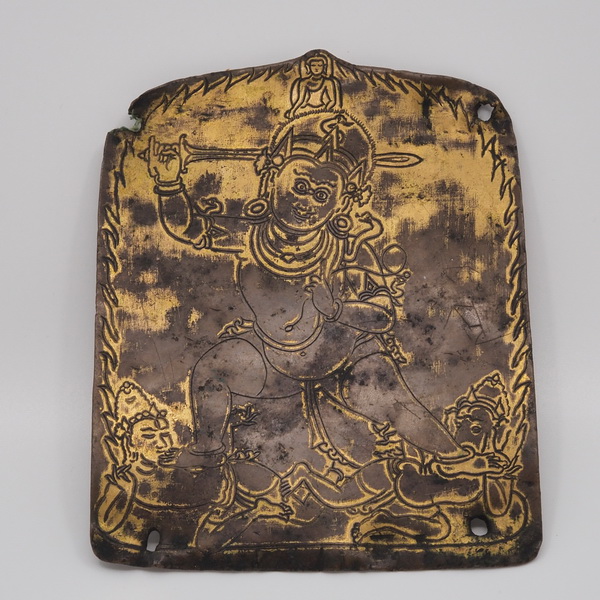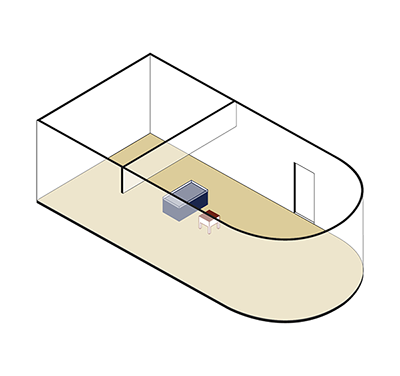ABS 329
Code: ABS 329
Country: Tibet
Style: Late Pala Style
Date: 1100 - 1200
Dimensions in cm WxHxD: 9.5 x 11.5
Materials: engraved gilt copper sheet
Nila-Achala or “Blue Achala”
Achala is the destroyer of delusions and one of the protectors of Buddha’s teachings. Because he is a protector, Achala always shows the fierce expression and attributes of a wrathful deity. He is frequently depicted with two protruding fangs. Sometimes one tooth points down, representing his compassion to the world, and the other points up, representing his passion for truth. Achala is often depicted with the Third Eye. He can be white (sita) or blue (nila).
Achala means "The Immovable One" in Sanskrit which refers to his ability to resist temptations. Frequently he stands on a rock or mountain to illustrate his affinity to these surroundings.
Stepping out to the right (pratyalidha), he stands on the brahmanical God Ganesha with the right foot, and with the left foot on another brahmanical deity, both lying on the lotus pedestal. In the raised right hand, he wields a sword (khadga) as a symbol of "cutting through ignorance". With the left hand, displaying the threatening gesture, he holds a noose (pasha).
Achala is clad in a tiger skin (vyaghracarma) tied around his hips. He is crowned with two snakes (naga) in front of the prominent knot of hair in which a small effigy of Buddha Akshobhya, his lineage holder, is seated. The “investiture with the sacred thread” (nagopavita), the anklets and the belt are composed of snake emblems. Achala is adorned with a pair of circular earrings, two necklaces, and bracelets. His body is framed with a flaming aureole which represents the purification of the mind
Achala is the destroyer of delusions and one of the protectors of Buddha’s teachings. Because he is a protector, Achala always shows the fierce expression and attributes of a wrathful deity. He is frequently depicted with two protruding fangs. Sometimes one tooth points down, representing his compassion to the world, and the other points up, representing his passion for truth. Achala is often depicted with the Third Eye. He can be white (sita) or blue (nila).
Achala means "The Immovable One" in Sanskrit which refers to his ability to resist temptations. Frequently he stands on a rock or mountain to illustrate his affinity to these surroundings.
Stepping out to the right (pratyalidha), he stands on the brahmanical God Ganesha with the right foot, and with the left foot on another brahmanical deity, both lying on the lotus pedestal. In the raised right hand, he wields a sword (khadga) as a symbol of "cutting through ignorance". With the left hand, displaying the threatening gesture, he holds a noose (pasha).
Achala is clad in a tiger skin (vyaghracarma) tied around his hips. He is crowned with two snakes (naga) in front of the prominent knot of hair in which a small effigy of Buddha Akshobhya, his lineage holder, is seated. The “investiture with the sacred thread” (nagopavita), the anklets and the belt are composed of snake emblems. Achala is adorned with a pair of circular earrings, two necklaces, and bracelets. His body is framed with a flaming aureole which represents the purification of the mind


